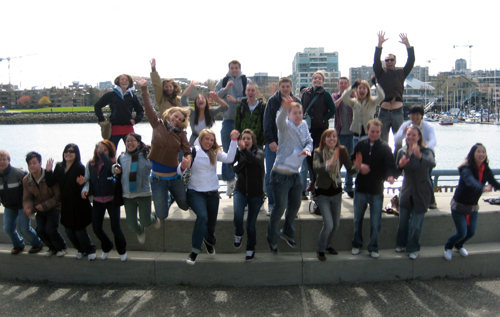Story by Samantha Beattie, a U of G student writer with SPARK (Students Promoting Awareness of Research Knowledge)

Your grade-school hunch was right: field trips are fun and help you learn.
Landscape architecture professor Lise Burcher went back to the roots of education when looking for ways to enhance student learning at the University of Guelph. “I wanted to develop an active learning strategy that extends continuously across various aspects of education,” she says, “including intellectual, emotional and physical boundaries.”
To understand what makes the field-trip experience worthwhile, Burcher is conducting a longitudinal study that compares students who go on a field trip with no preparation or reflection to those who plan ahead and later evaluate the field trip, using the Integrated Science Learning Environment model (ISLE).
ISLE is a well-established teaching method that requires students to identify learning objectives and conduct background research before undertaking a field trip. After the trip, students complete integrative assignments on how the experience affected their learning.
Supported by colleagues in the School of Environmental Design and Rural Development, Burcher has been surveying students for the past two years. Her results show that field trips are intrinsically valuable, fun and engaging for students. And the deeper relationships developed during off-campus trips – between students and with teachers – result in more memorable experiences.
But Burcher says ISLE adds an extra dimension. By doing preparation and reflection, students get a grasp of abstract concepts and retain their knowledge better than those who don’t participate in ISLE. “With ISLE, students get very involved with the community. By thoroughly investigating the area, they really gain a social and cultural understanding, which helps in developing their own social conscience and makes their school work extremely applicable to the real world.”
She points to students who took part in a field trip to Goderich, Ont., in the fall of 2011. The purpose of the project was to help rebuild the community after a summer tornado left parts of the town in rubble. Before the field trip, student groups researched ways to actively connect with people after a disaster. When the students arrived in Goderich, they were able to interact meaningfully with local citizens and learned more quickly what features would be important in a new design for the city.
After the trip, Burcher’s students completed their group design projects and presented them to the Goderich city council.
She says that by participating in ISLE, her students were able to uncover a lot of relevant and applicable ideas from the community – ideas that back up what they’re learning in lectures and are also more likely to be implemented in Goderich.
Burcher plans to continue the longitudinal study, looking for other ways to help students learn. “By conducting my research over a number of years, I have generated a body of results that accurately reflect what the learning benefits of ISLE are. From here, I plan to investigate other beneficial and active learning strategies.”